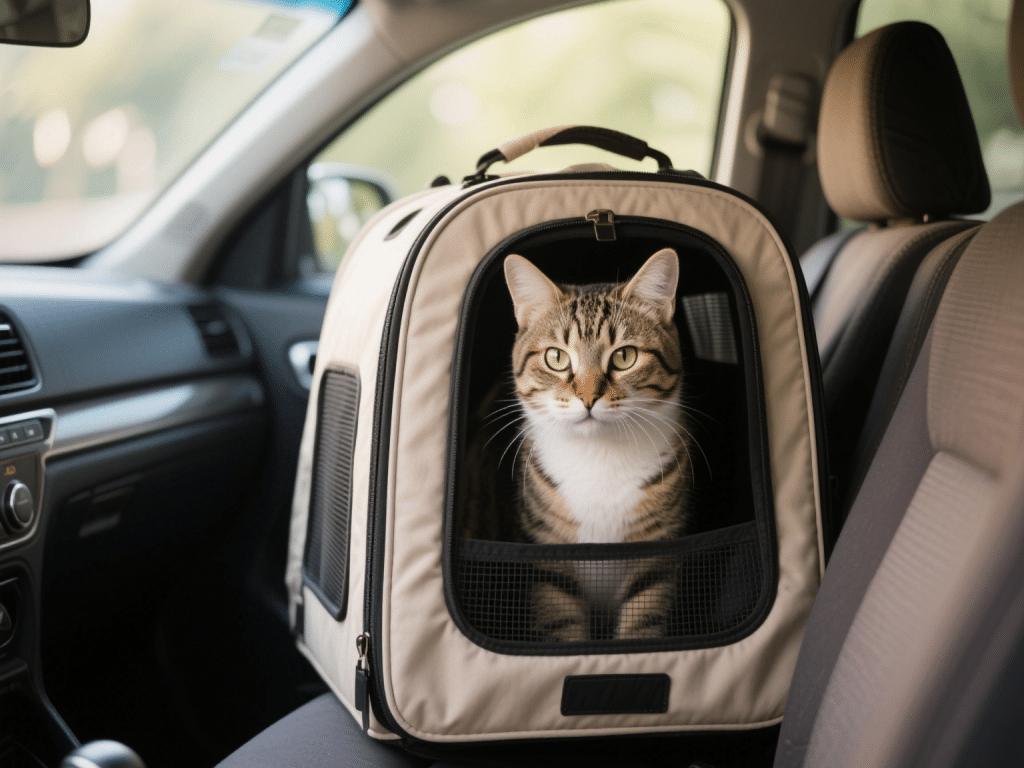
Traveling with Your Cat: Preparation, Carriers & Stress‑Reduction Techniques
Few things test a cat’s composure like travel. Yet with thoughtful preparation—carrier...
Introduction
While “catching a cold” in pets differs from human colds, dogs and cats can contract viral or bacterial respiratory infections that mimic cold symptoms: sneezing, coughing, nasal discharge, and lethargy. Early recognition and supportive care help speed recovery and prevent complications.
Common Respiratory Infections
Canine Infectious Tracheobronchitis (Kennel Cough)
Causes: Bordetella bronchiseptica bacteria, canine parainfluenza virus, canine adenovirus type 2.
Symptoms: Dry, hacking cough (“honking”), retching, sneezing, mild fever, reduced appetite.
Feline Viral Rhinotracheitis & Calicivirus
Causes: Feline herpesvirus type 1 (FHV-1) and feline calicivirus (FCV).
Symptoms: Sneezing, nasal/ocular discharge, conjunctivitis, fever, drooling (with oral ulcers in FCV), lethargy, decreased appetite.
Recognizing Symptoms
Coughing & Sneezing: Frequent bouts of coughing or sneezing, often worse with excitement or activity.
Nasal & Ocular Discharge: Clear discharge can become thick and yellow/green if bacterial infection ensues.
Lethargy & Weakness: Reduced interest in play, increased sleeping, reluctance to move.
Loss of Appetite & Weight Loss: Nasal congestion and sore throat can diminish appetite.
Fever: Elevated body temperature (normal: 101–102.5°F for dogs, 100.5–102.5°F for cats).
Difficulty Breathing: Rapid or labored breathing, open-mouth breathing in cats (emergency sign).
Home Care & Management
Isolate & Limit Exposure
Keep infected pets away from others to prevent transmission, especially in multi-pet households or boarding facilities.
Use separate food/water bowls, bedding, and litter boxes.
Supportive Comfort
Provide a warm, quiet space with soft bedding. Keep humidity levels up using a humidifier or steam from a hot shower to relieve nasal congestion.
Encourage fluid intake: offer extra water, ice cubes for cats, or diluted low-sodium chicken broth.
Warm, palatable foods: slightly warmed canned food may entice pets with reduced appetites.
Medication & Veterinary Care
Veterinary Consultation: Always consult a veterinarian to confirm diagnosis and rule out pneumonia or heart disease.
Antibiotics: If secondary bacterial infection is present (thick/discolored discharge, persistent fever), the vet may prescribe antibiotics.
Cough Suppressants: For severe, hacking cough not producing phlegm, veterinarians may recommend approved cough suppressants.
Antiviral & Supportive Treatments: Feline viral infections often require supportive care; for severe herpes flare-ups, antiviral medication (e.g., famciclovir) may be prescribed.
Environmental Sanitation
Disinfect food bowls, toys, bedding, and surfaces with pet-safe cleaners (see “The Safest Cleaning Products” article).
Wash hands thoroughly after handling an infected pet to avoid spreading pathogens to other pets.
Preventive Measures
Vaccinations: Ensure dogs receive Bordetella and parainfluenza vaccines, and cats are up-to-date on FVRCP (feline viral rhinotracheitis, calicivirus, panleukopenia) vaccines.
Avoid High-Risk Environments: Limit exposure to boarding kennels or shelters with ongoing outbreaks. If boarding is necessary, verify vaccination records and health protocols.
Boost Immunity: Provide balanced nutrition, regular exercise, and minimize stress to support a strong immune system.
When to Seek Immediate Veterinary Care
Labored or open-mouth breathing (especially in cats).
High fever (>104°F) unresponsive to rest.
Persistent vomiting or diarrhea.
Signs of pneumonia: rapid breathing, bluish gums or tongue, severe lethargy.
No improvement after 48–72 hours of home care.
Conclusion
Dogs and cats can develop respiratory infections resembling human colds. Recognizing symptoms—coughing, sneezing, discharge, lethargy—and providing supportive care helps pets recover quickly. Stay current on vaccinations, maintain a clean environment, and consult your veterinarian for proper diagnosis and treatment to ensure your pet’s swift return to health.

Few things test a cat’s composure like travel. Yet with thoughtful preparation—carrier...

A well-balanced diet lays the foundation for robust growth, vibrant shell coloration, and ...

Desert tortoises require precise UVB and thermal gradients to metabolize calcium and maint...

IntroductionWelcoming a new baby is a joyous time—but it can also be stressful for dogs....

Leash reactivity is a common behavioral issue where dogs overreact—by barking, lunging, ...

Safe Dog Travel Tips: How to Prepare Your Dog for TripsTraveling with your dog can be rewa...
Comments on "Can Pets Catch a Cold? Recognizing and Managing Symptoms" :